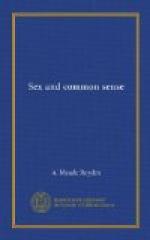to the service of Humanity itself, for nothing else
was great or wide enough for such a love. Does
anyone suppose that it was a mere instinct of asceticism
that drove St. Francis to make out of snow, cold images
of wife and child? Was it not rather the sudden
resurgent desire of the greatest of the saints for
some more humanly warm affection, something more individual,
something that nestles more closely to the heart, than
this great service of Humanity? And in a savage
irony he mocks his pain. “There are thy
children, there is thy wife,” says St. Francis,
and his cry is not the answer of the spirit to a lustful
temptation: it was the cry of a lonely human
heart for the human happiness of wife and children
and home. Aye, and I would claim that Our Lord
Himself had this desire. For I cannot doubt that
in that glorious young manhood of His, so full of power
and sympathy and love, this agony of longing sometimes
swept over Him. He whose vitality and power were
such that He hardly knew fatigue, who was so close
a friend, so much loved and sought by women, so tender
to little children, so young, so strong—is
it not certain that He was indeed “tempted in
all things like as we are”? How could one
so physically vital, so humanly and divinely full
of love, escape the conflict? That He conquered
we know; that He suffered we cannot doubt. All
His perfect humanity speaks to us in that lonely cry:
“The foxes have holes, and the birds of the air
have nests, but the Son of Man hath not where to lay
His head.” Do not dream, those of you who
may have to struggle with your own nature, do not dream
that Christ has not been there with you, that He had
nothing to feel or to suffer. How would He have
developed that spiritual power, how would He have become
so great a Lover of the world if He knew nothing of
that side of life? But He, and His greatest followers—St.
Francis of Assisi, St. Catherine and St. Theresa,
and countless others who have followed them—learned
to transmute that great creative force, disdained
both choices which I set before you, finding a nobler
and more glorious way. These would neither repress
this great impulse, nor dissipate it, but so used
it for the service of man that there is in all the
history of man no life more rich, more human, more
full of love, more full of creation, or more full
of power, than the lives of these celibate men and
women, who learned from Christ how they could live
and love.
It is not easy for men and women this way, but it is possible. It is possible, and it is glorious; and, in its degree, the need for it comes to everyone. Do not imagine that it is not needed in marriage as well as out of marriage. Every married lover will tell you that if his love is to remain what it was in the beginning—if it is rather to grow in power and beauty—he also must be able gradually to transmute his love in such a way that the spirit dominates the flesh more and more, and that the physical side of marriage becomes simply




